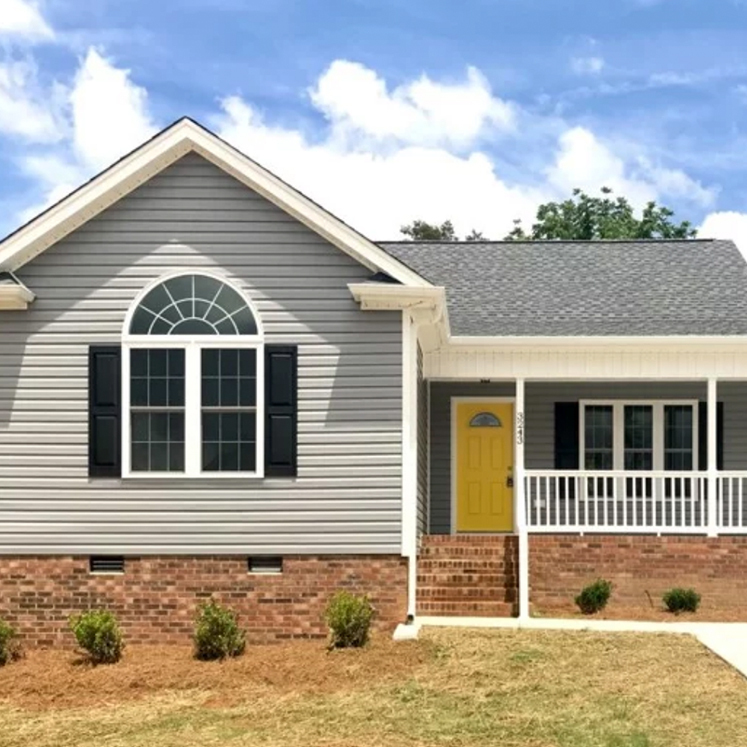SG Atkins Community Development Corporation creates affordable family housing near the WSSU campus
Carol Davis is on a mission, a mission that is centered around homeownership, its value to families and to creating a vibrant community. Her most powerful weapon is knowledge, particularly the fact that homeownership is not nearly as far out of reach as many believe.
Davis is the executive director of the Winston-Salem State University S.G. Atkins Community Development Corporation (SGACDC), a nonprofit organization that strives to foster community-based leadership focused on revitalizing the neighborhoods surrounding Winston-Salem State University.
“Our goal is to be a catalyst for economic development in the neighborhoods surrounding WSSU,” said Davis, adding that the SGACDC strives to improve the community by adding homeowners. “Most importantly we want to help buyers make a great investment that they can afford and will create equity for them.”
Over the past two decades, Davis and the CDC have worked with the Department of Housing and Urban Develop and the City of Winston-Salem to build 32 single-family homes and rehabilitate three single-family homes.

Affordable housing within the CDC’s target zone is scarce to nonexistent. ‘Affordable’ in this instance is defined as no more than 30 percent of a homeowner’s or renter’s gross income. Family incomes are lower in the target zone than many other areas of Winston-Salem, which makes it even more difficult to find housing to fit into the 30 percent of income formula.
“We try to price our houses as low as possible and look for families with incomes of 80 percent or below of the area median income (AMI) which translates to $61,500 for a family of four or $43,150 for an individual,” said Davis.
“There are affordable homes for rent, but not new ones for purchase. The neighborhood is full of ‘affordable homes’ for rent that are old and often in need of repairs.”
The majority of families in the area surrounding the WSSU campus rent housing, many because they don’t believe they can qualify for or afford a loan for a new home. That’s a housing cycle that Davis and the CDC are working hard to break.
“We know homeowners are great for the community because they have made an investment that they want to maintain,” said Davis. “They care about their neighbors and they care about what’s going on in the neighborhood.
“Part of our mission is to help families acquire an asset that will appreciate and help them accumulate wealth over the long term. In fact, many of our buyers have been long-time renters.”
Davis shared the story of one CDC home buyer who had been renting the same house for 30 years but had saved enough money for a down payment. She went to Winston-Salem’s Center for Homeownership and signed up for a program they offer about credit, mortgages and what to look for in a home.
“I met her at one of the classes,” Davis said. “We talked about where we were building and showed her our floor plans. She was able to pick the floor plan she wanted and got to see the house being built.”
That success story is a perfect example of the work Davis and the CDC has set as a goal: to turn the cycle of rent into a family investment in the form of a house.
“You have to pay for housing anyway so you might as well pay a mortgage instead of rent so that you can deduct your interest payments from your taxable income,” said Davis. “And you have an asset you can borrow against if you need to or sell and get your money back if you want to move.”
There are still difficulties many first-time homeowners face, but the CDC works case-by-case to serve as a guide through the process, a process which can be difficult even for those who have purchased homes multiple times. In addition, the CDC hosts homebuyer orientation workshops for anyone seeking information about the home-buying process. These workshops feature local housing counselors and mortgage lenders who answer questions and offer advice.
“The biggest hurdle for most buyers is having a good credit score and saving a down payment, but most lenders have relaxed those requirements and they are not as high as they use to be,” said Davis.
A credit score of 650 or higher is normally high enough to qualify for a housing loan and that many lenders have dropped the amount of money needed to put down to $1,500. Down payment assistance is also available to qualified applicants who wish to purchase homes within the CDC’s target area.
“Once they achieve those goals it’s not difficult to get homeowners to buy in,” said Davis. “Our most recent homebuyers have lived in other cities and are thrilled about the great deal they are getting here.”
The CDC is also very adept at leveraging other resources to bring additional value to the new homes. Solar panels are the perfect example.
“We were able to put free solar panels on the roofs of the last four homes we built through our partnership with the HBCU Coalition and a grant they received from the JPB Foundation,” said Davis. “We expect that the solar panels will produce savings of at least $70 a month or $840 a year.”
To find out more about this project and other S.G. Atkins Community Development Corporation initiatives, visit their website.
